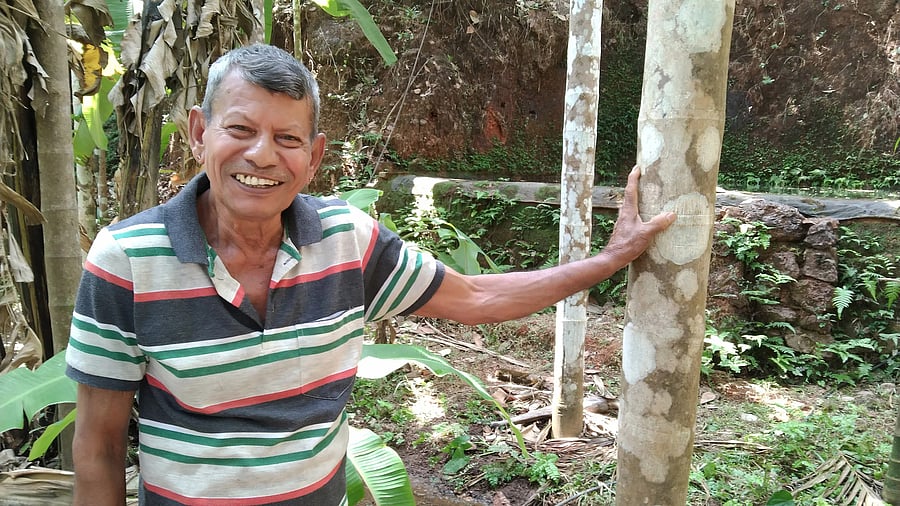
Bengaluru: The Indian Academy of Horticultural Sciences (IAHS) announced 12 awards and 10 fellowships to individuals carrying out exceptional work at the inauguration of the 11th edition of the Indian Horticulture Congress.
Dakshina Kannada’s Amai Mahalinga Naik was conferred the IAHS honorary fellowship-2025 for his outstanding contribution in promoting natural resource conservation and horticulture-based sustainable systems.
Popularly known as ‘Tunnel Man of Karnataka,’ Naik has single-handedly developed an organic agricultural farm with a zero-energy micro-irrigation system. He has constructed about 300 percolation trenches in the hills surrounding his farm, two revetments and a water tank with a capacity of 12,000 litres. His intervention transformed a deserted, barren plot of land into a lush green oasis comprising 300 arecanut palms, 75 coconut palms, 150 cashew trees and 200 banana trees.
Delhi-based Amit Kumar Goswami was awarded the ‘IAHS-DP Ghosh Young Scientist Award-2025’, for his contributions in Fruit Science. Serving as a senior scientist at ICAR-IARI in New Delhi, he is the lead breeder of guava hybrids — Pusa Pratiksha, Pusa Aarushi, Pusa Atulya and Pusa Jeevika, as well as co-developer of papaya varieties — Pusa Peet and Pusa Madhu.
“These are high-yielding varieties, providing 40% higher yield than commercial varieties available in the National Capital Region (NCR). These are already in the supply chain. With rapid climate change, the new varieties are important because the older varieties have become susceptible to deceases, and their yield is declining for various reasons. So coming up with new breeds is important for the future of farming in India,” he told DH.
The other awards presented include ‘Dr K L Chadha Memorial Award for Excellence in Horticultural Research and Development’ to Narayan Chawda, ‘Shivashakti Life Time Achievement Award’ to V A Parthasarathy, W S Dhillon, and ‘Dr Kirti Singh Medal in Vegetable Science’ to Vinay Bhardwaj, among others.
“Developments in the horticulture sector are significant in facilitating import substitution. Post Covid, we’re importing many exotic fruits, as health awareness among the public has increased. As a result, we’re spending over Rs 5,000 crore on importing fruits. Innovations in local fruit breeds can help curb this,” said G Karunakaran, who was conferred the IAHS fellowship in fruit science. He has played a pivotal role in the registration of three farmers’ varieties under PPVFRA-jackfruit (Siddu and Shankara with coppery red flakes) and tamarind (Lakshmana with high pulp recovery).
Some of the others who received the fellowship were Srikanth Bollapally for his contribution in promoting commercial hi-value floriculture and its value chain, and Balakrishnan Prithviraj, for promoting climate-smart horticultural practices.
Bollapally urged the government to improve the infrastructure for flower markets in Bengaluru.
“The government has helped the floriculture department develop over the past three decades with various subsidies, but the infrastructure remains poor and as a result every vendor resorts to selling on the footpath. This needs to change,” he said.
Horticultural Congress begins at GKVK
The 11th edition of the Indian Horticulture Congress and International Meet began at the University of Agricultural Sciences at GKVK on Thursday. It was inaugurated by Padma Bhushan awardee Dr RS Paroda former Secretary Department of Agricultural Research and Education (DARE) and Director General at the Indian Council of Agricultural Research (ICAR) and Dr Mangi Lal Jat Secretary DARE and Director General ICAR.
Speaking at the event Dr Jat highlighted the three mandates set by the Prime Minister for the agriculture sector — to focus on biofortified crops harnessing biodiversity and use of bio-based inputs for soil health management and emphasised that traditional crops should be explored for achieving nutritional security and also for climate resilience. Dr Paroda highlighted the role of the horticulture sector in achieving national security and commended the sector for surpassing cereal production.